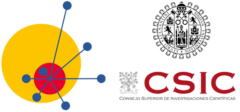Avelino Bueno, Full Professor of Microbiology (abn@usal.es)

1984-1988. PhD studies. Department of Microbiology, University of Salamanca. IMB, joint research center CSIC/University of Salamanca.
1989-1992. Post-doctoral Fulbright Fellow in Paul Russell’s lab (Department of Molecular Biology) at “The Scripps Research Institute” in La Jolla, California (USA).
1993-2002. Assistant Professor of Microbiology, University of Salamanca. Member of IMB, joint research center CSIC/University of Salamanca.
2002-present. Professor of Microbiology, Department of Microbiology and Genetics, University of Salamanca. Member of IBMCC at the Cancer Research Center of the University of Salamanca.
Resumè
Avelino Bueno received his Ph.D. from the Department of Microbiology at the University of Salamanca (USAL, Spain) in 1988 thanks to the support of a PFPI fellowship from the Spanish Ministry of Science and Education. His doctoral dissertation summarized the molecular characterization of genes encoding exocellular carbohydrolases from Bacillus species, a scientific project run under the supervision of Professors Francisco del Rey, Julio Rodriguez-Villanueva and Tomás González-Villa.
From 1989 to 1991, he carried out postdoctoral training in the cell cycle field in Dr. Paul Russell’s group at the Scripps Research Foundation in La Jolla (California) thanks to the support of a Fulbright Posdoctoral Fellowship. He remained there as a senior postdoc until the end of 1992 as a R+D employee of The Scripps Research Institute (TSRI). During this period of time he characterized genes involved in cell cycle regulation encoding key proteins such as the DNA replication initiator Cdc6, the G2/M kinase Swe1, and those encoding G2 and G1 cyclins Cig1 and Cig2 in yeast models (Cell 1991, EMBO Journal 1992, Mol Cell Biol 1993 and J Biol Chem 1994). He developed at TSRI a strong interest in DNA replication control mechanisms in the cell cycle field before starting his own research group at the beginning of 1993.
He formed his own lab at the University of Salamanca with a clear focus on specific DNA replication control mechanisms involving the initiator protein Cdc6/Cdc18, the Rad53/Chk2 checkpoint kinase, as well as phosphatases Cdc14/Flp1, using as experimental models both budding and fission yeast (JBC 99, JCS 99, JBC, 00, Nature 01, JCS 01 and 04, Genes&Dev 05, NARes 06, MBC 08), later to expand to cell cycle phosphatases Cdc14A and Cdc14B in animal cell models in collaboration with Dr. María Sacristán (JBC 05, CC 06/08/11, JBC 10, MBC 12, SR 18). Initially (1993-2000) his group was first established at the IMB Research Institute (USAL-CSIC) thanks to a tenured associated professorship position to later move to the Cancer Research Institute (IMBCC USAL-CSIC), in 2001, as a full professor of Microbiology. In the last ten years his lab has been particularly interested in the mechanism reverting PCNA ubiquitylation. In particular, his research team has been focused in understanding the biological meaning of PCNA deubiquitylation during S-phase to uncover the consequences of altering this evolutionarily conserved eukaryotic mechanism (BST 10, PLoS Genetics 12, PLoS ONE 13, Scientific Reports 16, Cell Reports 19).
It is important to mention that throughout the years, he has established productive scientific collaborations with Spanish and International Research Groups (i.e.: Sergio Moreno, IBMCC; Pedro San Segundo, IBFG; Rodrigo Bermejo, CIB; Viesturs Simanis, ISREC-Lausanne; Karim Labib, Dundee University; Luis Aragón, MRC-London). Finally, it is also noteworthy to acknowledge that, from 2012 to 2016, Dr. Bueno has been Director/Coordinator of the Master Degree in Biology and Clinic of Cancer, official title of the University of Salamanca, a key part of the Postgraduate School of the Cancer Research Institute in Salamanca (IMBCC USAL-CSIC)











